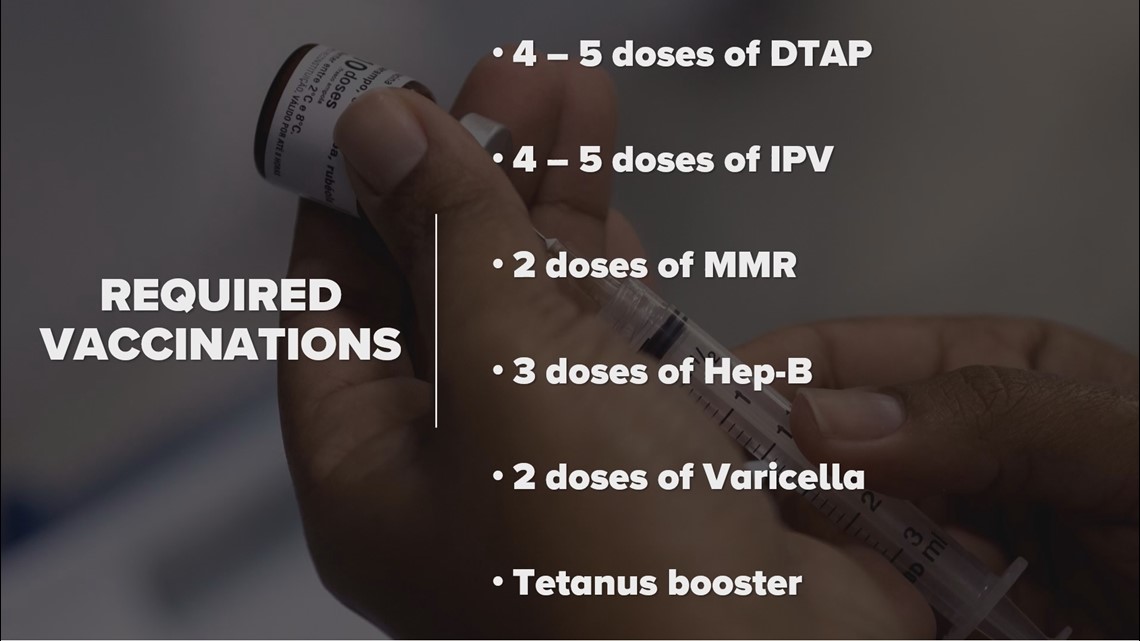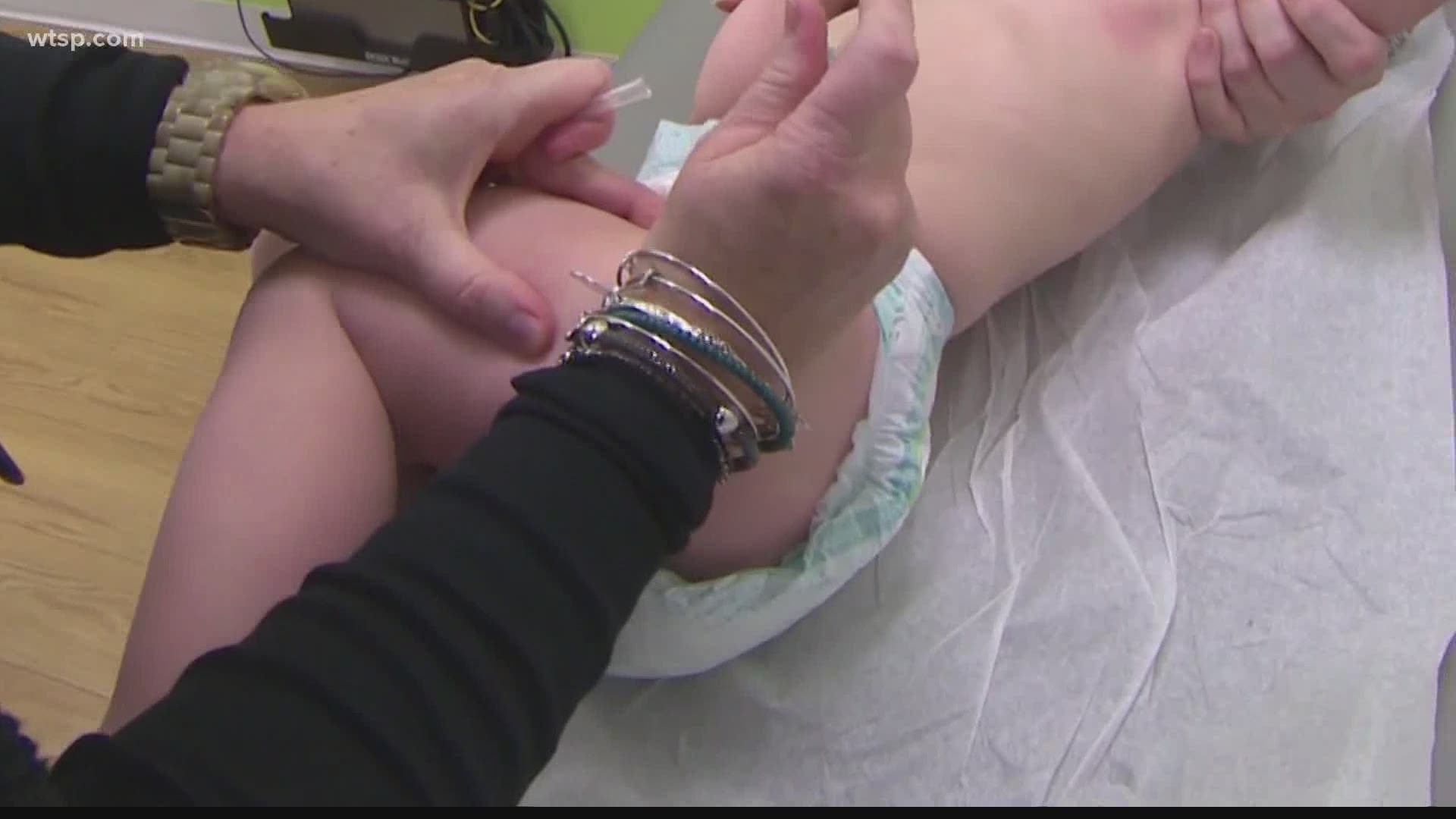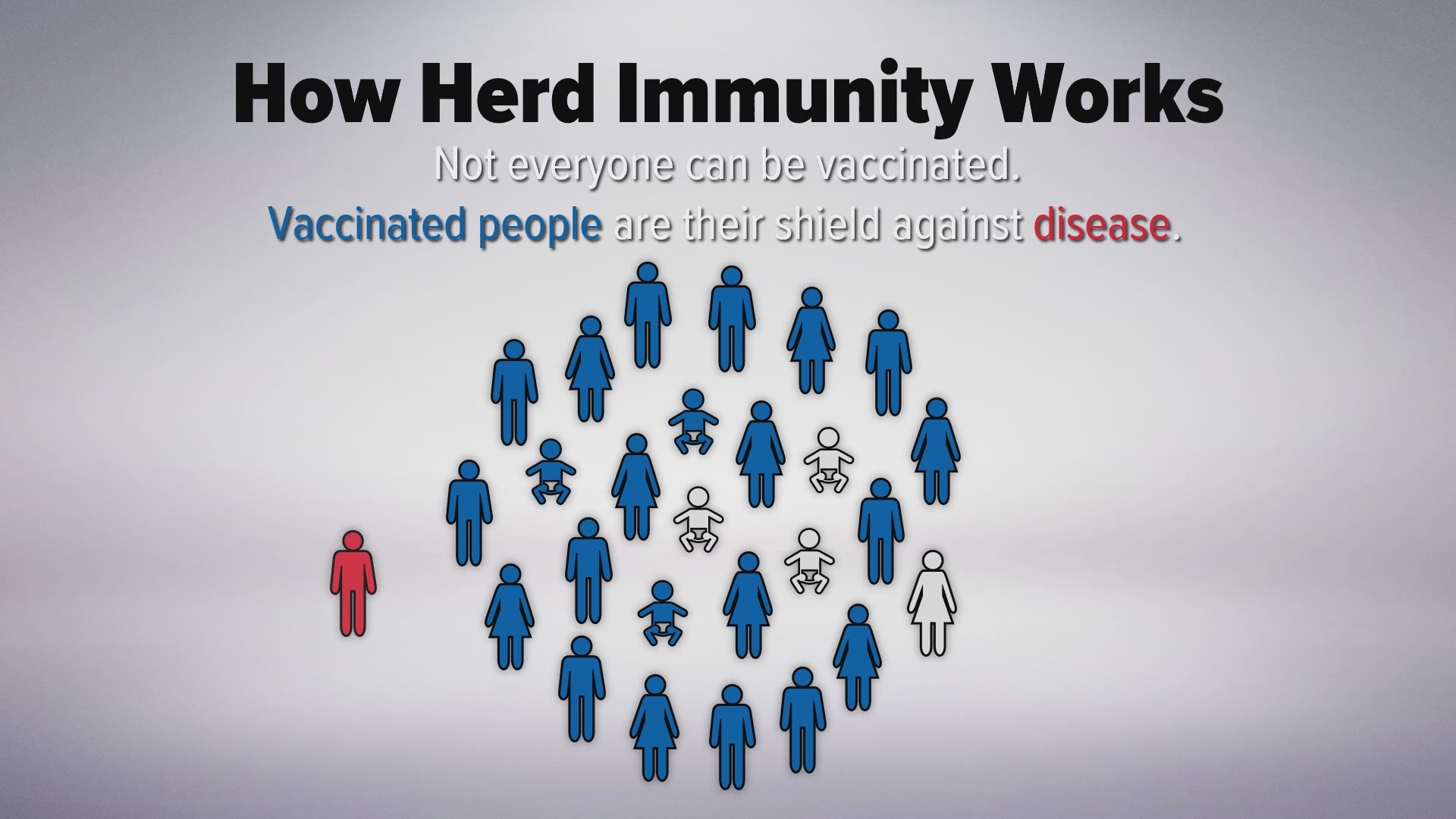TAMPA, Fla. — In the state of Florida, there’s been a dramatic decline in the number of children getting vaccinated for preventable diseases. Doctors are concerned about potential outbreaks.
Governor Ron DeSantis has urged parents to take their children to the pediatrician and get up-to-date on vaccines that are required for school age children.
“For parents, one of the things that we’ve noticed is a decline in the immunizations for children. We have seen measles outbreaks in different parts of the country just before all this started, and so if you’re not keeping up on that, that’s a problem,” said Gov. DeSantis.
There are implications right now and in coming months for preventable diseases like measles, pertussis, chicken pox and more. Vaccines provide immunity for children and the community.
Since the start of the pandemic, the number of Florida children getting required vaccinations for school has dropped by as much as 60 percent some months as stay-at-home orders and fear of contracting the virus have kept families away from doctor's offices.
Having trouble viewing the graphic below? Click here to see this chart full screen or to explore the data further.
“The biggest scare has been, like, leaving the houses,” said Dr. Mildred Perea.
Perea is a pediatrician who works in the Lutz office of Pediatric Health Care Alliance.
She says she has been shocked that fewer children are getting shots.
“Absolutely! Yah, definitely this is not something that we have seen before,” she said.
According to the Florida Department of Health, the herd immunity threshold for a disease like measles is between 93 and 95 percent. That means at least 93 percent of the population needs to be vaccinated or have immunity to protect others and prevent outbreaks.
The Florida Department of Health’s Kindergarten and Seventh Grade Immunization and Status Report 2019-2020 School Year shows that during the previous school year, 93.5 percent of all kindergartners in the state were up-to-date on all vaccines.
Right now, even with an uptick across the board from April 2020 to May 2020, it doesn’t appear to be on track to hit that.
“It’s very concerning. One of the things that I’m worried about and anticipating is that by next year we’re going to have new outbreaks of diseases we haven’t seen for a while,” said Dr. Juan Dumois.
Dumois is an infectious disease specialist at Johns Hopkins All Children’s. He went through the data and noted April’s drops in children vaccinated for diseases like DTP, MMR, Polio, HepB, HiB and Varicella.
He says while parents will likely rush to get caught up before school, he says know this: the unvaccinated are at risk in summer camp or even in restaurants.
“Chickenpox and measles are among the most contagious viruses around. If those vaccination rates are going down, then that’s gonna give those viruses an opportunity to establish a new foothold,” he said.
Dumois says herd immunity is key. It protects kids, parents and the vulnerable – including infants – from not just measles but diseases they do see in the community such as pertussis or whooping cough.
“Pertussis will kill babies and we had a baby die here about three years ago from pertussis, just a few months old. It’s not something to play with.”
Eighteen-month-old Anthony Zumbano has never missed a well-check with his pediatrician. His parents say they never questioned delaying his appointment for his 18-month shots and well-check.
“He got his vaccines. He wasn’t happy about it,” said his mom, Bernadette Casey.
She says she felt safe with the measures in place at Pediatric Health Care Alliance and wanted to make sure he stayed on track. She pointed out that vaccines are a choice she and her family make for their children.
“If I can prevent him from getting chickenpox and the measles and the flu and everything, I’m willing to do everything to prevent it,” she said.
Pediatric Health Care Alliance has implemented new procedures at all locations. Those measures include curbside check-in, telehealth and constant cleaning. Appointments for well-children are in the morning, doctors see sick children in the afternoon.
Dr. Perea says the longer you delay shots, the longer it takes to catch-up. She says that is especially true for infants who have a strict schedule every two months. She says there must be a six-week span between when a child can receive another booster.
10 Investigates’ Courtney Robinson asked if she was doing a lot of those catch-up vaccines right now.
“I would say yes. Right now, I think after we reach out to the parents, where we explain what type of safety procedures we have, people have been more receptive to say, ‘Ok. I feel comfortable coming in. It’s a safe environment. I don’t have to sit in a waiting room packed with people,’” she said.
The American Academy of Pediatrics started a new campaign: #CallYourPediatrician. It uses humor to pass on an important message to parents: going to the doctor is important and safe.
“The pediatricians’ offices have implemented so many more strict precautions than what you experience in a grocery store. It is just that much safer,” said Dumois.
Dr. Perea provided 3 things parents can do right now:
1. Call your pediatrician
2. Ask questions: Is my child on schedule? What are the safety measures in place?
3. Reschedule any missed appointments as soon as possible
The Florida Department of Health says that even during distance learning school-age children must be up to date on vaccines.
“Any student that is enrolled in a virtual/homebound program that is connected to a local public school district, is required to meet the same entry requirements as a student attending a brick and mortar school. These virtual students are still counted as a district student and have the same requirements and privileges that any other student enrolled has,” said FL DOH spokesperson.
By the time your child starts Kindergarten they should have:
4-5 doses of DTP: Diphtheria, Tetanus and Pertussis
4-5 doses of IPV: Polio
2 doses of MMR: Measles, Mumps and Rubella
3 doses of HepB
2 doses of Varicella: Chicken Pox
Seventh graders need a tetanus booster shot and parents can also then consider the HPV vaccine.
The Florida Department of Education echoed what DOH provided to 10 Investigates:
"Any student that is enrolled in a virtual/homebound program that is connected to a local public school district is required to meet the same entry requirements as a student attending a traditional school. These virtual students are still counted as a district student and have the same requirements and privileges that as traditional students," it said.


- DeSantis, citing increased testing as COVID-19 cases climb, says no changes for Florida's reopening
- This big cloud of dust heading toward Tampa Bay could mean spectacular sunsets and unlikely hurricane chances for now
- Will more counties follow St. Pete's new face-covering order?
- New St. Pete police hiring process will allow a civilian to sit in on interviews
- Multiple persons of interest in Wendy's arson during Atlanta protest
- Atlanta officer charged with murder in death of Rayshard Brooks
- Florida bridge at 'risk of imminent collapse,' Coast Guard warns
FREE 10 TAMPA BAY APP:
►Stay In the Know! Sign up now for the Brightside Blend Newsletter




